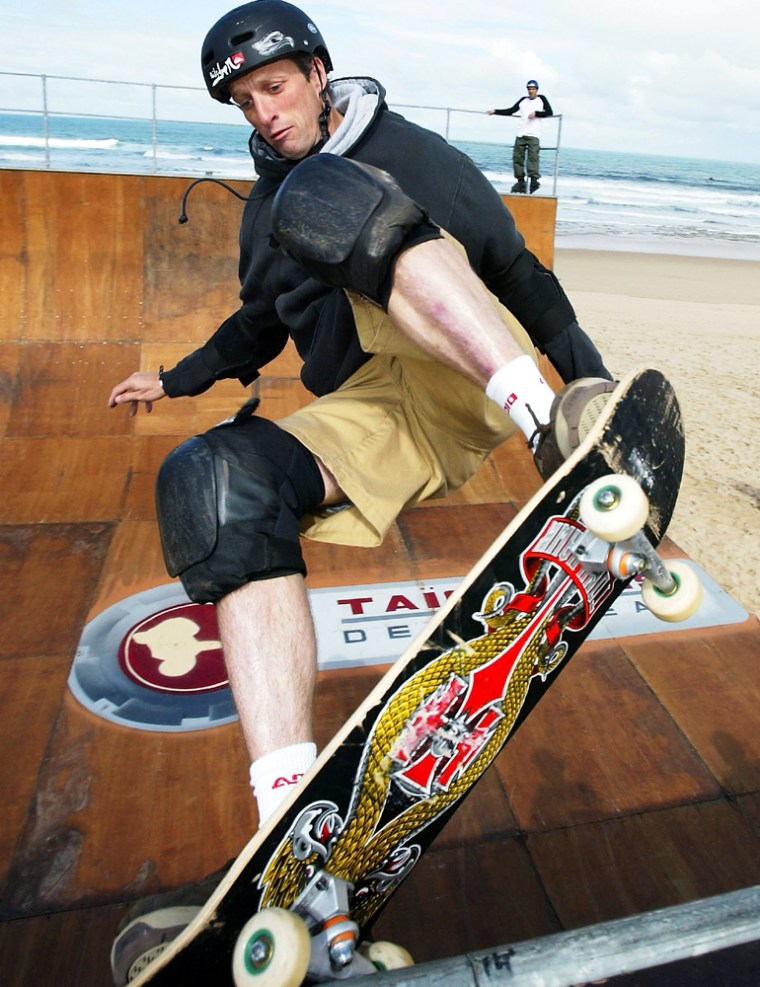Tony Hawk has been falling off skateboards for three decades, but in November he took the scariest tumble of his high-flying career. Inverted 11.5 feet in the air on a fullloop, Hawk, 36, stalled and crashed, plummeting headfirst. The botched stunt left him with a concussion, a fractured pelvis, 15 stitches above his left eye, the bull's-eye for one beauty of a shiner. It was so violent that even MTV, which was filming, kept it off the air.
Broken bones are a cost of doing business for the world's most famous skateboarder. "The Birdman," a beanpole at 6 foot 3, has endured a dozen concussions, broke his elbow, and cracked his skull and several ribs. He has two screws in one elbow, has knocked out his two front teeth three times and has ripped up his legs so often that his shins bear more scars than skin. He jokes that his ankles sound like a tin drum roll when he climbs the stairs.
But look at the feats for fans to savor — the 80 air-bending tricks he created, the 73 first-place titles. Hawk earns upwards of $9 million a year, all for defying gravity on a toy that once was the domain of 12-year-old boys. Last year Tony Hawk's brand generated $300 million in retail sales: clothes, skateboards, arena tours and, above all, videogames. Now he must pull off a daunting new stunt: phasing out his bone-crunching performances while keeping the money rolling in for years to come.
In a decade skateboarding has swerved from the fringe into the mainstream, rolling up $5.7 billion a year in equipment and apparel sales. Eleven million kids use skateboards in the U.S., more than the number in organized baseball. Tony Hawk drives the sport harder than anyone else, having transformed himself from cult hero into a richly compensated pitchman for McDonald's and other brands looking to buy attention from youngsters. "Used to be a successful skateboarder had his picture in a magazine and then got some free stuff," he says.
Skateboarding's big rise began in 1995, when ESPN aired its first X Games, a faux Olympics for "alternative" sports. Hawk, who started skateboarding at age 8 in San Diego, Calif., was already a legend among skateboarders. He signed on and enlisted cool skateboarders who might otherwise have rejected the event as crass commercialism. Hawk took first place in the "vert" category for aerial tricks and gained a national following. "From the get-go, Tony realized the value of the exposure," says Christopher Stiepock, general manager of the X Games.
Three years later Hawk struck a deal with Activision for his own skateboarding videogame. An avid gamer, Hawk insisted on creative input and met with the developers weekly, tweaking the combinations of aerial stunts while ruling out outlandish moves and rejecting some backdrops as too cornball, like one of an Egyptian pyramid. Released in 1999, Tony Hawk's Pro Skater was an instant success, selling 5 million copies. Activision has since churned out five Tony Hawk games (another is on its way) and sold 20 million copies.
Celebrity 100: Ramp to riches
Tony Hawk earns upwards of $9 million a year, all for defying gravity on a toy that once was the domain of 12-year-old boys.

/ Source: Forbes